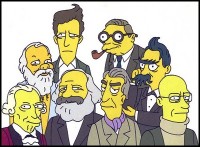PACTISS recommends

Where science meets art. The only necessary and sufficient book store in Melbourne.
Hope our friends enjoy the new look and feel – now optimised for mobile devices for access on the go.

PEOPLE
-
Coordinator: Peter Ellerton
Web guy: Jason Etheridge RESOURCE COLLECTIONS
NEW RESOURCES
-
- A nice Philosophy of Mind summary
- The power of categorical logic
- What exactly is the scientific method and why do so many people get it wrong?
- Paralympic athletes faster than olympic athletes — what does this tell us about difference?
- Logic: if + then = why? How can we understand the power of logic?
- How do we ensure we are exposed to new ideas? A parody with bite.
- A Life of Meaning (Reason Not Required) – What is the nature of our relationship with reason?
- Can you name this cognitive bias?
- By what measures can we value human life?
- Teaching philosophy improves standardised scores
- Are we in control of our own decisions?
- Neuroscience and education: myths and messages
- Free will is not as free as we think – and that’s ok.
- Where’s the Proof in Pseudoscience?
- Science in the lead?
RANDOM POSTS
-
- The dilemma of giving
- Queensland Philosophy and Reason Syllabus
- Utilitarianism
- Science and art from Dilbert
- Philosophy Games
- Philosophical Health Check
- Philosophy of Religion - Teleological Argument
- Philosophy of Religion Essay Assignment
- When bad consequences are predicted but are permissible if a good consequence is intended.
- Banning Religion - An interesting hypothetical
USEFUL RSS FEEDS
 Philosopher’s Zone
Philosopher’s Zone NYTimes – The Stone
NYTimes – The Stone Philosophy Now
Philosophy Now RSA Animate
RSA Animate- The Green Corridors Initiative
- Governance governing government
- Why print money when we can print wealth?
- Building a resilient health and care system
- We'll always have Paris?
- Experimentation and equity in global cities
- Technology-enabled deliberative democracy
- Healthier placemaking
- Creating a sovereign wealth fund in Wolverhampton
- Economic recovery and climate action
 Scientific American – Mind and Brain
Scientific American – Mind and Brain- Kindness Can Have Unexpectedly Positive Consequences
- It's the Bass That Makes Us Boogie
- Subliminal Cues, Precisely Timed, Might Help People Forget Bad Experiences
- Severe COVID May Cause Brain Changes Similar to Aging
- Autism Treatment Shifts Away from 'Fixing' the Condition
- Fatherhood Changes Men's Brain, according to Before-and-After MRI Scans
- Many People with Bipolar Disorder Use Cannabis. It May Sometimes Help
- Why Social Media Makes People Unhappy--And Simple Ways to Fix It
- People Shopping for 'Meaning' Buy Cheaper Goods
- Pregnancy Changes the Brain, Possibly Promoting Bonding with a Baby
 TED talks
TED talks- Can the metaverse bring us closer to wildlife? | Gautam Shah
- The billion-dollar pollution solution humanity needs right now | Stacy Kauk
- Are video calls the best we can do in the age of the metaverse? | Josephine Eyre
- How great leaders take on uncertainty | Anjali Sud and Stephanie Mehta
- How Indigenous guardians protect the planet and humanity | Valérie Courtois
- How to tap into your awareness -- and why meditation is easier than you think | Yongey Mingyur Rinpoche
- Demystifying the wild world of crypto | Laura Shin
- How can we escape soaring energy bills? Stop using fossil fuels | Tessa Khan
- A disability-inclusive future of work | Ryan Gersava
- How to tackle the stigma of living with HIV | Gareth Thomas
THEMED RESOURCES
- December 2022MonTueWedThuFriSatSun282930123456789101112131415161718192021222324252627282930311
Category Archives: Resources
The power of categorical logic
The sum of all knowledge in two books…
Posted in Critical Thinking, Media Articles, Cartoons
Tagged categorical logic
Comments Off on The power of categorical logic
What exactly is the scientific method and why do so many people get it wrong?
There’s a big difference between science and pseudoscience. But if people don’t understand how science works in the first place, it’s very easy for them to fall for the pseudoscience. Source: What exactly is the scientific method and why do … Continue reading
Posted in Critical Thinking, Media Articles, Cartoons, Philosophy of Science
Comments Off on What exactly is the scientific method and why do so many people get it wrong?
Paralympic athletes faster than olympic athletes — what does this tell us about difference?
Four 1500m runners in the T13 class at the Paralympics all ran faster in their final than the time that won American Matthew Centrowitz the gold medal at the Summer Olympics in Rio last month. Source: Paralympics Rio 2016: 1500m … Continue reading
Posted in Media Articles, Cartoons
Comments Off on Paralympic athletes faster than olympic athletes — what does this tell us about difference?
Logic: if + then = why? How can we understand the power of logic?
Hold on to your modus ponens; we’re getting serious about precision. Logic works in a surprising range of places, from the law to your smart phone. It’s all about propositions and connectives—if you infer validly you should end up with … Continue reading
Posted in Media Articles, Cartoons
Comments Off on Logic: if + then = why? How can we understand the power of logic?
How do we ensure we are exposed to new ideas? A parody with bite.
Assuring users that the company’s entire team of engineers was working hard to make sure a glitch like this never happens again, Facebook executives confirmed during a press conference Tuesday that a horrible accident last night involving the website’s algorithm … Continue reading
Posted in Critical Thinking, Media Articles, Cartoons
Comments Off on How do we ensure we are exposed to new ideas? A parody with bite.
A Life of Meaning (Reason Not Required) – What is the nature of our relationship with reason?
If philosophy is to stay relevant, it must bridge the gap between feeling, thought and reason. Few would disagree with two age-old truisms: We should strive to shape our lives with reason, and a central prerequisite for the good life … Continue reading
Posted in Critical Thinking, Media Articles, Cartoons, Philosophy of Mind - Consciousness, Philosophy of Religion, Philosophy of Science
Comments Off on A Life of Meaning (Reason Not Required) – What is the nature of our relationship with reason?
Can you name this cognitive bias?
Posted in Critical Thinking, Media Articles, Cartoons
Comments Off on Can you name this cognitive bias?
Teaching philosophy improves standardised scores
Want to improve NAPLAN scores? Teach children philosophy Latest figures show that student scores in reading, writing, language and numeracy have failed to improve despite schools receiving record funding over the past few years. The National Assessment Program – Literacy … Continue reading
Posted in Critical Thinking, Media Articles, Cartoons
Comments Off on Teaching philosophy improves standardised scores
Are we in control of our own decisions?
Dan Ariely — One of the most significant of TED talks for understanding how we think.
Posted in Critical Thinking, Media Articles, Cartoons
Comments Off on Are we in control of our own decisions?
Neuroscience and education: myths and messages
NATURE REVIEWS | NEUROSCIENCE Abstract: For several decades, myths about the brain — neuromyths — have persisted in schools and colleges, often being used to justify ineffective approaches to teaching. Many of these myths are biased distortions of scientific fact. … Continue reading
Posted in Critical Thinking, Media Articles, Cartoons, Philosophy of Mind - Consciousness
Comments Off on Neuroscience and education: myths and messages
Free will is not as free as we think – and that’s ok.
The Philosopher’s Zone – ABC Radio National (Australian Broadcasting Corporation) Free will is on the run. Bit by scientific bit, the belief that we might actually command our own domain is in retreat. But all is not lost, according to … Continue reading
Posted in Media Articles, Cartoons
Comments Off on Free will is not as free as we think – and that’s ok.
Where’s the Proof in Pseudoscience?
Peter Ellerton, The Conversation Contrast this with homeopathy, a field that has generated no discernible growth in knowledge or practice. While the use of modern scientific language may make it sound more impressive, there is no corresponding increase in knowledge … Continue reading
Posted in Critical Thinking, Media Articles, Cartoons, Philosophy of Science
Comments Off on Where’s the Proof in Pseudoscience?
Science in the lead?
Is scientific progress outpacing progress in areas such as ethics and politics? What does progress in these areas look like?
Posted in Ethics and Moral Philosophy, Media Articles, Cartoons, Social and Political Philosophy
Comments Off on Science in the lead?
Plato and Aristotle from ‘The School of Athens’
Plato advocating for the Forms, Aristotle for the world. Add in the word ‘basketball’, and you cannot unsee it.
Posted in Media Articles, Cartoons
Comments Off on Plato and Aristotle from ‘The School of Athens’
Teaching the nature of science (and keeping students engaged)
Peter Ellerton, The Conversation What’s particularly disturbing about current science education at the primary, secondary and tertiary level is the almost complete lack of explicit consideration of what I’ve referred to as the “nature of science”. Not only are many … Continue reading
Posted in Critical Thinking, Media Articles, Cartoons, Philosophy of Science
Comments Off on Teaching the nature of science (and keeping students engaged)
Why You Don’t Know Your Own Mind
Alex Rosenburg, The Stone. It is often said that we can never truly know the minds of others, because we can’t “get inside their heads.” Our ability to know our own minds, though, is rarely called into question. It is … Continue reading
Posted in Critical Thinking, Media Articles, Cartoons, Philosophy of Mind - Consciousness, Philosophy of Science
Comments Off on Why You Don’t Know Your Own Mind
The value of subjective experience (or not)
From smbc
Posted in Media Articles, Cartoons, Philosophy of Mind - Consciousness, Philosophy of Science
Comments Off on The value of subjective experience (or not)
Free will and mobile phones
Can you prove you have free will?
Posted in Media Articles, Cartoons, Philosophy of Mind - Consciousness
Comments Off on Free will and mobile phones
A Critical Thinking Matrix
Exploring the relationship between cognitive skills and the values of inquiry. Grey boxes describe student work. This can be used to generate rubrics. CT Matrix
Posted in Critical Thinking, Syllabus and Course Outlines
Comments Off on A Critical Thinking Matrix
The Skills, Values and Virtues of Inquiry
A model for understanding effective thinking through categorising key educational ideas and examining the relationships between them. Skills Values and Virtues of Inquiry
Posted in Critical Thinking, Syllabus and Course Outlines
Comments Off on The Skills, Values and Virtues of Inquiry
